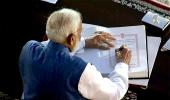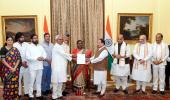While the coalition will not be unstable because of pressures, the effort from partners will be to constantly remind the central government and the BJP how much it is dependent on them.

As many as 11 members of the Bharatiya Janata Party's allies have found place in Narendra Modi's new council of ministers.
While five got Cabinet berths, two were appointed minister of state with independent charge. Four others took oath as minister of state.
The nature of the pressures from the primary alliance partners -- Janata Dal-United) and the Telugu Desam Party -- on the BJP is likely to be quite different, most analysts say.
While they do not feel the coalition will be unstable because of these pressures, the effort from partners will be to constantly remind the central government and the BJP how much it is dependent on them.
Hyderabad-based political analyst Ashok Tankasala said the TDP would seek both forbearance on investigation of past grants given to Andhra Pradesh and fresh grants especially for hydel projects such as the Polavaram hydel scheme, crucial for carrying water to East and West Godavari and Krishna districts and it includes a canal that will carry water to Vishakhapatnam.
It was Chandrababu Naidu who as chief minister of post-bifurcation AP (2014-2019) had sought clearance for the project.
However, his rival Jagan Mohan Reddy's constant taunt at the time was that funds for the project were diverted for other purposes.
The result was the Polavaram project never came to fruition.
"It was the incomplete Polavaram project that was among the issues that ousted Naidu and brought Jaganmohan Reddy to power," Tankasala said.

When Andhra Pradesh was formed, a verbal assurance was given that the new state would get 'special category' status.
But this special status was not included in the Act to set up Andhra Pradesh.
Later, in accordance with the recommendations of the Finance Commission, 'special status' to all states was abolished.
In speeches in 2015 and 2016, Naidu said 'special status' was not a 'sanjeevani' and that Andhra Pradesh would be content with a special 'financial package' instead.
However, even this did not materialise.
The overall impression is that Naidu's demands will be financial rather than bargaining about Cabinet ministerships.
The issue of Amaravati as state capital and funds for development for it will dominate discussions.
However, this is fraught with problems.
According to norms of the central government, funds for a new capital (including the ones created in the past in 2000, like Uttarakhand and Jharkhand) can be given only for essential buildings such as a secretariat and court houses.
However, Naidu has submitted a detailed plan for the overall infrastructural development of Amarawati as the capital.
Managing this contradiction will be central to the workability of the alliance.

The workability of the alliance between the BJP and the JD-U will be materially different.
The JD-U is in coalition in Bihar with the BJP. Elections are due in the state in 2025.
Of the 243 seats in the state assembly, the BJP has 82, the JD-U 47, and the Hindustan Awam Morcha (Secular) three.
One Independent is supporting the Nitish Kumar government.
The JD-U will find itself out of power if it rocks the boat at the Centre and riles the BJP, which can threaten to pull out of the Bihar government.
"It is a symbiotic relationship. The JD-U and BJP are dependent on each other," said a former Bihar bureaucrat.
JD-U office-bearer KC Tyagi had already set the tone for the relations between partners by asserting that the INDIA alliance had offered Nitish Kumar the position of prime minister, which he had declined, opting instead for the National Democratic Alliance.
Kumar himself has declared at the meeting of the NDA that the alliance would be stable and consistent.
"All this is to convey to the BJP that the alliance is not a one-sided vivashata (compulsion)," said the bureaucrat.
Feature Presentation: Aslam Hunani/Rediff.com












 © 2025
© 2025